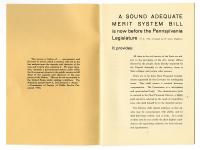For this lesson, students will examine a series of documents that help to demonstrate the reasons that civil service reform became a significant cause during the late 19th and early 20th centuries. They will also see the arguments that were used by civil service reformers to lobby in favor of adopting the merit system at the local, state, and federal levels of government. Finally, they will be asked to surmise why it took so long for the merit system to be implemented in Pennsylvania.
In a US History course, this lesson should come as the culmination of the class’s coverage of Gilded Age politics, patronage, and Garfield’s assassination. In a Civics or Government course, this lesson could be taught as part of a unit on federalism (showing how federal policies do not directly influence what goes on at the state level) or as part of a unit on political efficacy and interest groups, showing how persistent interest groups have to be as they lobby for reforms.


